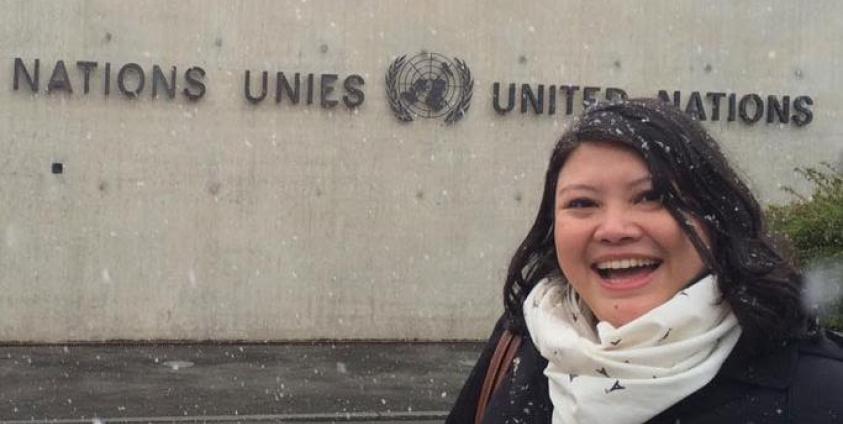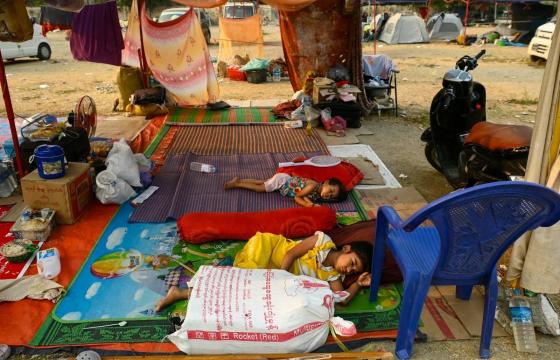Despite having spent most of her life outside of her home country, Yee Mon Htun has devoted her career to empowering marginalized groups in Myanmar, and globally. As a child, she fled what was then known as Burma with her family following the 1988 pro-democracy uprising, and after spending more than five years in Thailand, they immigrated to Canada as government-sponsored refugees.
Yee Mon Htun obtained her Juris Doctor specializing in international law. She was selected by women Nobel Peace Prize winners of the Nobel Women's Initiative to lead the first-ever international campaign to stop rape and sexual violence in conflict. She returned to Myanmar in 2012 hoping to contribute to law reform efforts aimed at strengthening rule of law. She served as the inaugural Director of the Myanmar Program for an international legal non-profit: Justice Trust. After four years spent advocating for human rights and training farmers, human rights defenders and activists, journalists and lawyers to affect change, Yee Mon Htun secured a position at Harvard Law School as a clinical instructor and lecturer on law in the school's International Human Rights Clinic.
Having never lost sight of her commitment to Myanmar, Yee Mon Htun has served as legal counsel advising various communities on some of the nation's most pressing legal issues, from land rights, to criminal defamation, to the laws concerning prevention of violence against women. Yee Mon Htun recently spoke with Mizzima by phone from Harvard Law School to discuss the draft Protection and Prevention of Violence Against Women Law (PoVAW law).
With the draft National Protection and Prevention of Violence Against Women Law having been discussed for so many years, why has substantive change been so hard to realize?
For one thing, gender inequality and discrimination against women has never been acknowledged as a cause for concern in this country. The blanket denial that men and women enjoy equal opportunity has persisted since colonial times. Violence against women is endemic affecting women and girls from all walks of life. Women’s rights organizations have voiced their concern about it and the failure of the criminal justice system in addressing it.
The penal code doesn't offer sufficient provisions, which is why this PoVAW law is a real chance for women in Myanmar to be afforded a degree of protection. Initially, the lead ministry drafting the law engaged with women's groups, with international organizations including UN Women soliciting input. However, in the last couple of years, the draft law has been circulated around to various ministries. These ministries have free reign to censor and remove different provisions of the draft law without much gender sensitivity. The end result is a draft law that is very different from its original incarnation and does not nearly go far enough to protect and prevent violence against women.
Furthermore, the whole legal process has been opaque. The various ministries who have removed key provision have not provided justification or informed key civil society actors including women’s rights organizations about the changes. It has been very difficult for local women’s rights experts to engage with the process as it has not been open to the public. The stalled draft law and process is indicative of the lack of political will when it comes to fundamental women rights.
As party to The Convention on the Elimination of all Forms of Discrimination Against Women (CEDAW), Myanmar is obligated to enact and prioritize an effective and comprehensive law on gender-based violence. We have been waiting five years to pass the first ever law to address violence against women.
Meanwhile, the Race and Religion Protection Laws, which in actuality infringe on women’s rights, were drafted and passed in a mere 27 months. It is shocking to have the country be party to an international women's rights convention, and domestically a woman cannot make her own reproductive choices because she's married to a person of a different faith, or that if she wants to convert to another faith must get permission from authorities.
But all is not lost. I genuinely feel that there is a way to course-correct. You've got expertise in the country; women's rights leaders and civil society organizations who know the full magnitude of the social problems, the barriers and the solutions. And if the ministries and the drafters genuinely believe in gender equality and ending violence against women in Myanmar, they need to consult them and make this issue not just a “women’s rights issue” but a national issue affecting everyone.
How optimistic are you about the possibility of enacting a new law in early 2019?
That depends … I think there are certain things that they could do – engage with the experts, consult women’s rights organizations who probably have a better understanding of these issues than they do, consult LGBTQI groups, and understand why trans women and sexual minorities need to be protected from violence as well. If those kinds of steps are taken, I think I will be very optimistic.
But if it's just empty gestures or checking the box to quickly to pass a weak draft law because they know that it's been dragging on so long, I would be disappointed. After all, it won’t be coming from a place of genuinely wanting to promote gender equality and alleviate the suffering of survivors.
What have you learned through your experiences offering legal counsel to organizations in Myanmar to enact women's rights legislation?
I'm just awestruck by the brilliance and the resilience of the women of Myanmar, as well as the LGBTQI community. They're so collaborative. You've got this sort idea that the people in Myanmar are not able to work across different lines, but the one hope that I have for peace and stability in Myanmar is that I've been in the thick of these different communities with women from different religious backgrounds, different ethnic backgrounds, social status, class, and they're able to see and understand each other and come together to work for change. No matter how hard the battle is, how much the odds are against them, I am in awe of their resiliency and determination to keep going until everybody is able to realize their fundamental human rights.
In what ways does the decades-long history of armed conflict in Myanmar make the fight for women's rights more challenging in Myanmar?
Women's bodies are constantly used in Myanmar for political gain. You hear allegations of rape, sexual violence to rally communities against religious minorities. The Tamadaw’s use of rape as a weapon of war has been fully documented by ethnic national women's groups and yet impunity persists for these known perpetrators.
When you think about it, violence against women is so normalized in Myanmar. In the non-conflict zones, it is difficult to hold perpetrators accountable due to the lack of gender sensitivity and/or rampant corruption within the criminal justice sector. And then in conflict zones, the survivors have little to no recourse for accountability, as the 2008 Constitution doesn’t allow civilian courts to have oversight in trying members of the Tamadaw. And the military tribunals are closed off with the community never knowing the outcome of trials or whether justice has been served.
For people of all backgrounds in Myanmar who want to see progressive change, what is your greatest piece of advice?
I think it's really crucial that we confront our past and not just “Burman” wash things. We are a multi-ethnic, multi-faith country and our diversity is our strength, so we need to embrace that. The traditional ways of Buddhist Burman dominance have not brought us peace, and if anything, the legacy of military rule based on exclusionary identity politics has brought us to the current state of affairs. Our country is home to the world’s longest-running armed conflict. We are one of the poorest countries, with weak institutions and rule of law. People don't enjoy fundamental rights or freedom.
However, I believe that we can acknowledge our painful past, learn from it, and by making different choices we can overcome and build a peaceful Myanmar that is inclusive where everyone’s fundamental rights and freedoms are respected. I have had the distinct privilege of working with sisters and brothers from different ethnic and religious backgrounds who share this vision but have long been excluded. Embracing change may feel scary but I hope that people are able to bravely face it. For as the Greek philosopher Heraclitus said, “Change is the only constant in life”. I hope that the change that arrives is a brighter new dawn breaking over Myanmar.








